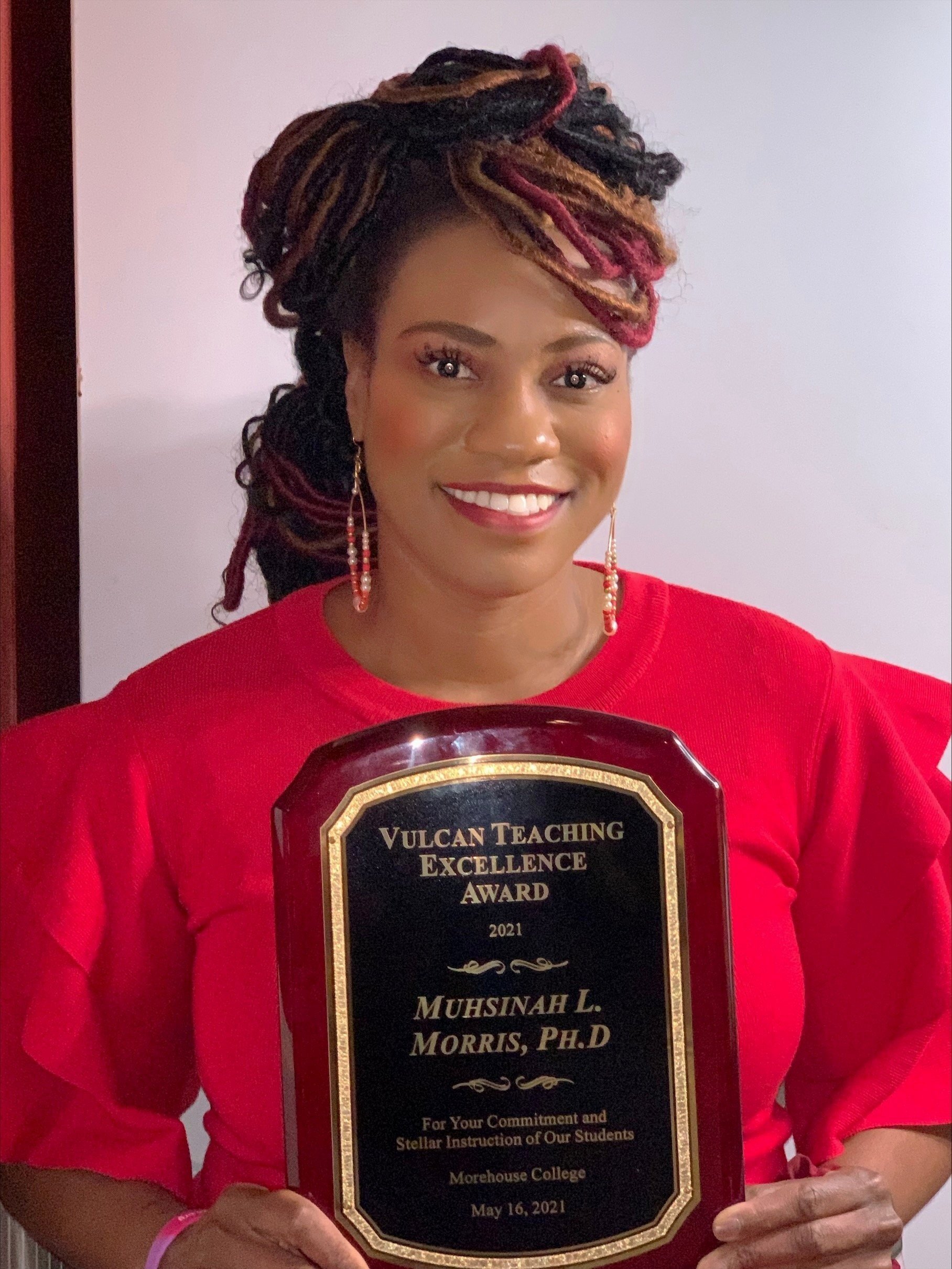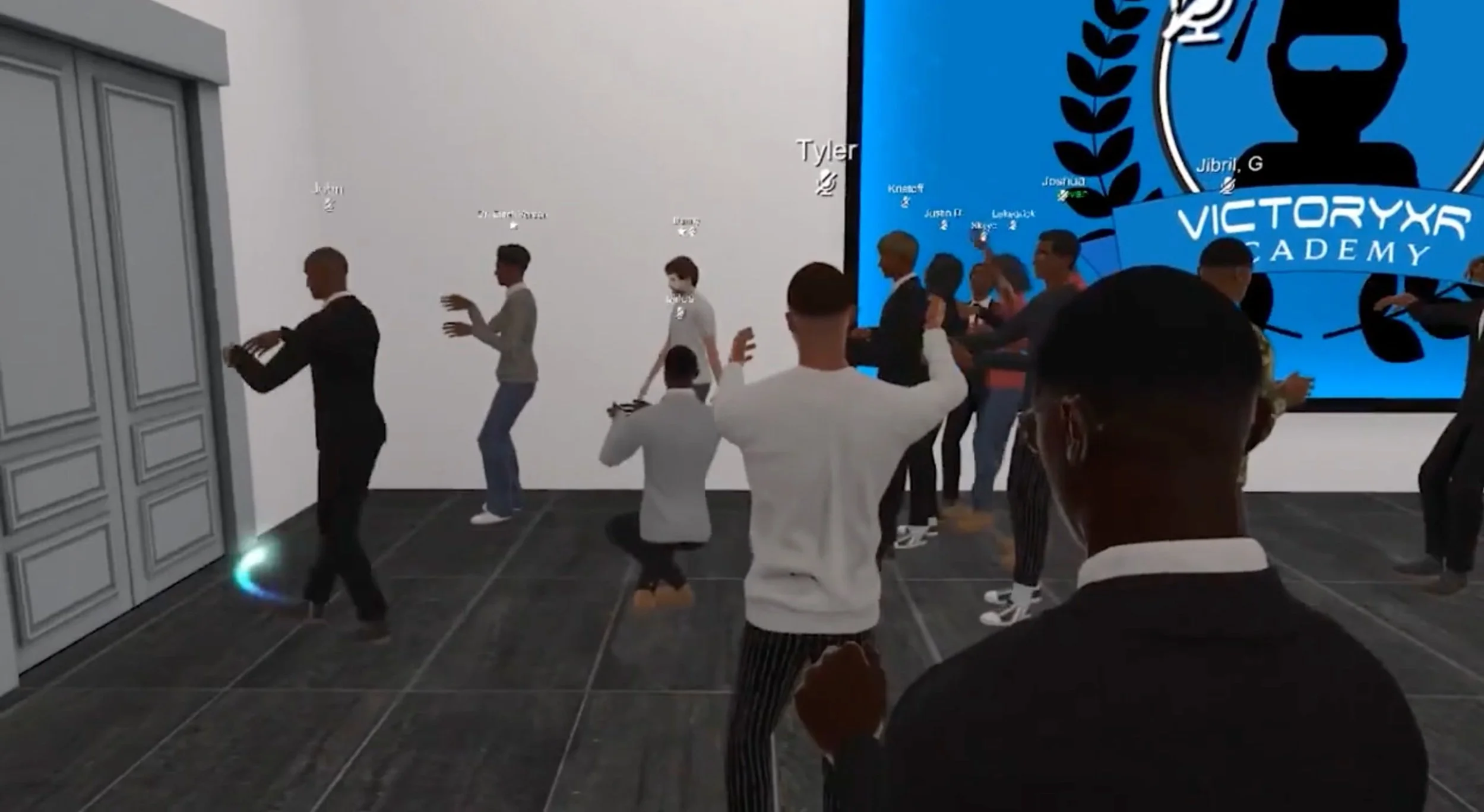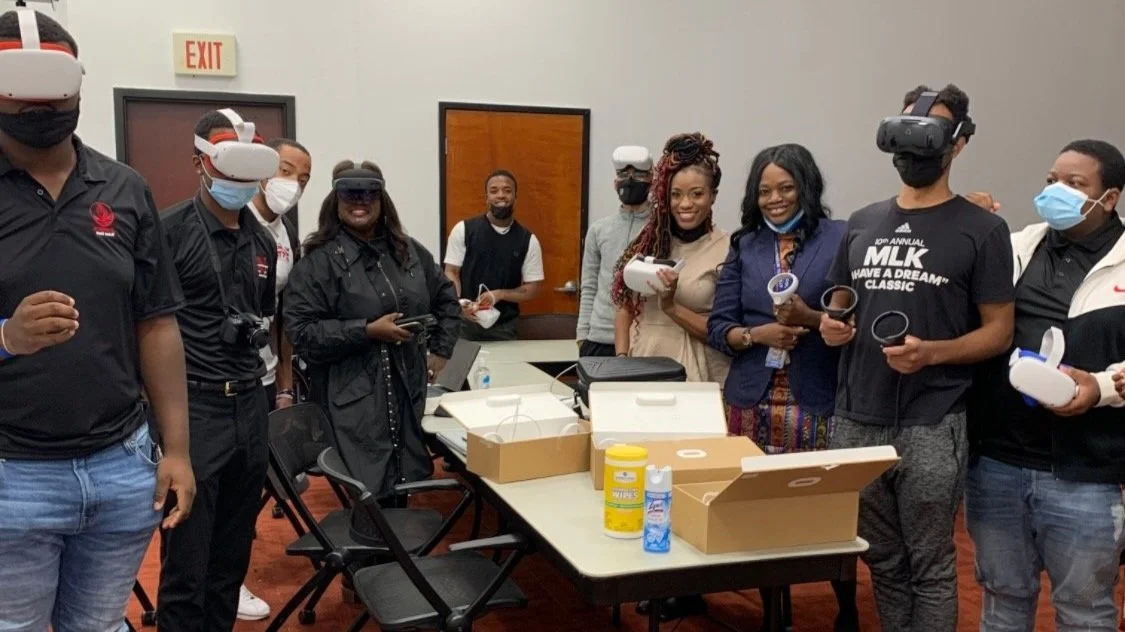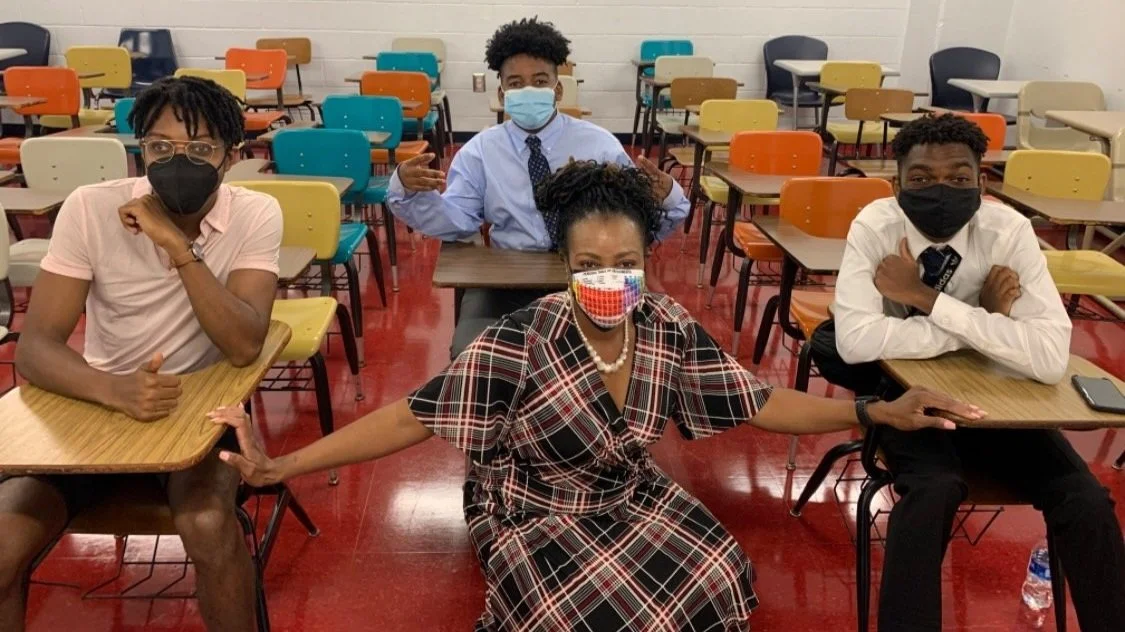Dr. Muhsinah Morris
Dr. Muhsinah L. Holmes Morris is the Academic Program Director and Assistant Professor of Chemistry at Morehouse College in Atlanta. She is part of the ‘Ultimate Team’ that has just made history by creating and teaching entire university subject courses in virtual reality classrooms. But being a VR pioneer is only one part of her story. Dr. Morris is also a committed researcher, an award-winning teacher, a Volunteer Advocacy Advisor for Autism Speaks, and a caring mother to five sons. We met up with her to talk about the future of learning, VR innovation, inclusion and her love for chemistry.
Muhsinah, you received a B.S. in chemistry from Clark Atlanta University and an M.S. and Ph.D. in chemistry from Emory University. How did you develop your passion for science?
That’s a good question. I think I have a unique family. I am the third of four children, and my parents were considered blue color workers. I come from a humble background, but education was very important to my family. A few generations back my ancestors started the first school after slavery in their town. They turned the local Chapel into a school for young black children. So, I come from a long line of educators from my mom’s side of the family. My mother, Alice Holmes was my first teacher and I think I got a Ph.D. just for her to stop saying how important education is. My mom knew that education was the great equalizer for us as Black people in America. She exposed us to the very best she could in terms of encyclopaedias and history books, so as young children we were able to study about inventors and explorers.
Perhaps an even bigger influence was my older brother Gordy, who caught meningitis at the age of 4. He was a child prodigy and a brilliant kid with a very high IQ. He had a stroke and was unable to walk and take part in life as we would have wished for such a gifted boy. I knew as a small child that there was a tragedy in my family, and I felt that I could heal my brother by figuring out what happened to his brain, and then I would go on and fix it. I was very curious and always mixing, testing, and playing around with materials, liquids and formulas, mainly from my mother’s kitchen before I got my chemistry set. I enjoyed being in this exploratorial world. My father, Gordon Holmes was a wonderful auto mechanic and problem solver and he taught me all about computers and technology, taking things apart and finding and fixing problems. I learned about how to be excellent in every facet of life from my parents.
.
At Morehouse you are the Interim Department Chair and teach analytical chemistry, advanced inorganic chemistry and general chemistry. The lab is your ‘living room’ and your students call you Dr. M.O.M. Can you share your educational philosophy and how you fell in love with chemistry?
I am very proud to be called Dr. M.O.M which stands for ‘Molder of Minds’. I do teach chemistry but what I am really thriving on is teaching students how to be humble and learn how to love themselves and love the people around them, how to care about humanity, sustainability, and justice. If this happens, they can learn anything they want to. They can go on and fix what is wrong in the world which is a complex and highly interconnected set of issues. They can make a powerful difference. My teaching philosophy always starts with making connections with my students before asking them to perform. Learning what they want to get out of life is crucial. They can teach themselves chemistry. I try to teach them how to think. I help them find purpose in the world. Breaking down the walls from I CAN’T and building a bridge to the mindset of I CAN! That’s my call as an educator.
How did I fall in love with chemistry? At my school we had this program called ‘Science, Tools and Techniques’ where we learned all about the different sciences. When we started with chemistry, my professor suddenly spoke a language I totally understood. My chemistry teacher became a role model for me – he drunk his coffee out of beakers and was in a lab coat all day. He taught me everything there was to know about chemistry, lab reports, research, and methodology. I fell in love with chemistry thanks to him and my approach to problem solving and understanding complex contexts and concepts came from there. However, as a black girl in a black school environment we were taught a lot about career paths and not so much about research, but I know I wanted to take this route. The part of chemistry that resonated most with me was using instrumentation in the lab. The use of software and hardware for science always interested me. I also developed a fast interest in video games and became a gamer girl. I immersed myself in anything I could with computers, graphic design, graphs, charts, anything really where I could create something. I always had this creative technology edge to me, besides my passion for chemistry.
VR brings a new dimension to learning and catapulted Morehouse College not just into the metaverse but into the history books as one of the first worldwide to teach subject courses in a virtual setting. How did you start your personal journey into VR?
Let me give you some background to my connection with VR. My husband is a network design engineer for AT & T and has all game systems known to mankind. When headsets came out, we both were really excited about what experiences that could bring but it was early doors and it fizzled out because it was very limited. I knew about VR and was waiting for the technology to get better, so I could do something with it in class. Like lab simulations or something similar. Then the Corona pandemic changed our lives, and we were looking for ways to teach our students without being on Zoom all the time. We made a start with Pico, asynchronous VR headsets, that came with preloaded science lessons. They only downside was that although it was a great experience for the students, I could not be with them in the same space. It was a disconnected experience. Then I met Steve Grubbs, the CEO of VictoryXR, and learned about his VR campus ideas. It was perfect timing. We used Quest and the Engage platform and Steve came up with the plan to design a digital twin campus of Morehouse College, which was the answer to a lot of our challenges.
Over the period of two months, we conceptualised the designs for subject classrooms including curricula content and logistical issues such as deploying headsets to students and training teachers and students. The next step was to design chemistry courses which was very close to my heart, and I worked with him to pioneer a course, and create content that allows students to learn chemistry in VR. We became one of the world’s first Colleges to teach subject courses in VR and to have a digital twin campus up and running. At Morehouse, our teachers always innovated and used the latest technology in their classrooms. Half of the current cohort of VR teachers, including myself, have won the Vulcan Award for Teaching Excellence. We are very proud to be able to pioneer and innovate for our students. I believe that VR provides a pathway for creating that inclusion through immersive education, vocational rehabilitation services, and therapeutic experiences.
You are teaching in the virtual reality classroom, what is the difference to teaching in a physical classroom? Can both forms of learning coexist in the future?
The advantages of teaching in the virtual classroom are vast and can provide more engagement than in person instruction. Students are in a distraction free environment where the learning is happening in real time 3D. Students can venture to new worlds, that are not possible without VR, to explore various subjects. It can be that they visit a different time period or a geographical location, including another solar system or galaxy. Students are able to visualize atoms and molecules which is not possible in the analog world. Teachers are able to bring complex instrumentation into the classroom or dissect species that are too expensive in the real world because of purchase costs but also storage and disposal. Unconventional experiments can be carried out in VR without worrying about hazardous waste material byproducts. Students are still able to collaborate with one another just as if they were in person. The teachers can set up the environment in a way that they feel is conducive to learning. Teachers are usually limited to spacing and resources in the typical classroom but in VR, you can find the 3D asset and incorporate it into your lesson simply. So both forms of learning should coexist in the future. It is imperative that students understand the utility of learning with technology. They should also have access to emerging and cutting edge technologies. The best type of learning happens when students are able to apply their knowledge in the real world and to a meaningful problem. Learning in VR gives teachers an opportunity to provide application as something other than a case study. It truly provides a higher form of learning.
Looking at your impressive work as an educator and researcher and your additional commitments at the National Community Advisory Council, the Grant Review Committee and as a Volunteer Advocacy Advisor for Autism Speaks, how do you manage to make it all happen?
I am a woman of faith and since my childhood I was encouraged to dream about impossible things and work hard to make them possible. I always wanted my life to be full, and experience all the good things life has to offer. I am a mother of 5 and amongst all other things in my life the love for my family and all the things I am blessed to be involved with give me energy. My message is to encourage women that they CAN! They CAN be mothers, wives, daughters and still pursue their dreams, may it be professionally, socially or academically.
Thank you, Muhsinah for sharing your inspiring journey. Keep pioneering in 2022! For more information about her work and Morehouse College visit www.morehouse.edu and follow her on LinkedIn. You can also catch her in the upcoming workshop ‘VR in Education’ 29th January 2022.






